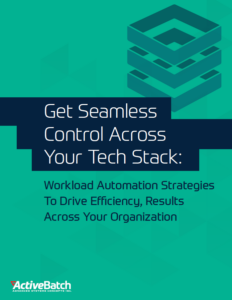Choosing The Right Vendor For Your IT Automation Initiative

The right software can help your organization deliver new services, optimize processes and improve productivity, among other benefits. The wrong software can waste hundreds of thousands of dollars and deal a blow to the business (and your career).
So how can you guarantee you’re making the right decision? You’ve compared products and feature checklists and even spoken with product customers. But how much of your due diligence has been focused on the vendor?
Working with the wrong vendor can mean tearing out and installing another solution, costing your team time and resources and impacting the business. More than just features and capabilities, the support and partnership of the vendor can be the deciding factor in whether you achieve your goals.
Here are five things to consider when comparing potential vendors.
Product Roadmap
Make sure you talk to vendors about where their products will be in five years. Most vendors should be able to explain what new capabilities are under development, and what the goals are for the product moving forward.
This is important because you want to ensure that the product will keep up with new technologies and trends — that the vendor is invested in making sure your team will be able to keep up with competition.
Vendor History
Of course, a product roadmap means little if the vendor isn’t around in five years. So, how can you determine the life expectancy of a potential vendor? Viewing a product roadmap is a good place to start, but also look into the vendor’s history. Is the vendor a new start-up without much investment, or is the vendor a market veteran that has been evolving its product for many years? Has the vendor been acquired and sold multiple times in the past?
That last piece of information is an important consideration. Larger vendors will often purchase competitors and then cut investments in development and support. In some cases, this can give smaller vendors an advantage in that the same team has been developing and maintaining the product for a longer period of time, avoiding the brain drain that can occur during acquisitions.
Additionally, a vendor with an expansive product portfolio increases the chances of products being discontinued during economic downturns, or sold or spun-off. Vendors that specialize in specific products can often provide more certainty and stability, especially in enterprise software markets.
Customer Support
At some point during your product evaluations, you will likely seek out customer reviews. There are multiple dozens of review sites including G2, Gartner Peer Insights and IT Central Station. Make sure your research includes customer support.
Customer support services can vary widely between vendors and can have a big impact on the success of your automation plans. See if you can compare customer support satisfaction scores between vendors, and see what vendors provide 24/7 support. Also, ask vendors if their support services are provided by an internal team or a third-party business. Customer support teams that work directly for the vendor have deeper product knowledge and can enlist the help of the product engineering and development teams, which can be useful when implementing a new use case or solving a complex issue.
Customer Success
Many vendors are expanding customer support into customer success programs. Customer success programs focus on building the client-vendor relationship by providing more resources for customers as well as investments into ease-of-use and optimization technologies.
Customer success programs (CSPs) often include customer success managers who are assigned to client accounts, giving customers a single point of contact with the vendor. This improves support by allowing customer success managers to gain a deeper understanding of customer needs and use cases.
A customer success program will often begin with white glove onboarding in which the vendor works side-by-side with the customer to install and configure the software solution. CSPs can also include health checks in which the vendor will assess the customer’s use case in order to provide specific recommendations to improve ROI. These health checks can also be supplemented with self-healing technologies that apply AI to detect possible issues and to deliver single-click options for correcting or optimizing processes.
On-Demand Training
Vendors should be invested in customer success. This includes providing training to help your team consistently improve ROI as automation use cases expand over the years. On-demand training courses provided online can help your team quickly onboard new employees and to help team members build skills. Training courses should be in-depth and role-based, designed for specific user needs.
The right enterprise software can be a springboard for future successes. Training and customer success programs can help your team build the experience and know-how they need to meet new demands.
Don’t Settle For Unreliable Automation
Improve reliability and extensibility across your environment with the right workload automation strategies and tools.








